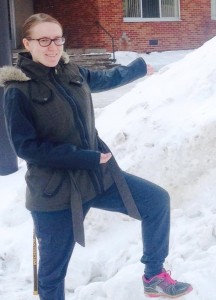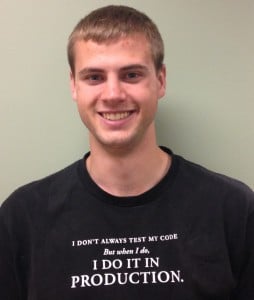 Sarah is working to achieve a Computer Network and System Administration major
Sarah is working to achieve a Computer Network and System Administration major Sarah is working to achieve a Computer Network and System Administration major
Sarah is working to achieve a Computer Network and System Administration majorA great article on why the ideas behind why the policies are in place must be discussed with the students so they understand why the policies are in place.
Why Policies Fail to Promote Better Learning Decisions
The William G. Jackson Center for Teaching and Learning schedules events for faculty and instructional staff to provide opportunities to learn new instructional strategies and tools and meet colleagues from other departments.
Coffee Chat -The Future of iClickers (10/1): Student response systems continue to evolve, and many (including iClicker) are moving toward replacing dedicated devices with phone or tablet apps. These apps offer new tools for instructors and students and potentially lower costs, but reliability and the potential distraction caused by the device is of concern to many. In this session, we’ll discuss the changes iClicker is making and look at some app-based products that have already been piloted on campus. Our goal: gather input about whether/when a change in (or addition to?) the campus standard is appropriate. All clicker-using instructors are encouraged to attend! Coffee and light refreshments will be provided to those who register by Wednesday, September 30. Join us for this event on Thursday, October 1 from 3:30 to 4:30pm. Click here to register.
Lunch and Learn — Jackson Blended Learning Grant Showcase (10/13): In January 2015, through a generous gift from William G. Jackson, the CTL awarded $1000, $5000 and $10,000 grants to teams of instructors for blended learning projects at Michigan Tech. This luncheon will showcase these grant projects, which include ways to share and organize blended learning content items, flipped-classrooms, and even a new online course. Participants will be invited to explore the work funded by these grants prior to the luncheon and then select facilitators for further conversation. The goal is to encourage participants to use blended techniques in their classes. Lunch will be provided to those who register by Friday, October 9. Join us for this event on Tuesday, October 13 from noon to 1:00pm. Click here to register.
Pedagogical Workshop — Fostering Productive Group Dynamics in Instruction (10/20): Due to the positive response of the CTL’s 2013 Great Groups Lunch and Learn event, the CTL collaborated with Sonia Goltz and Roger Woods from the School of Business and Economics to develop and deliver this workshop for Michigan Tech instructors and staff. This workshop is ideal for those who support students in team projects—in courses or other contexts. Workshop participants will learn about group development and explore strategies for setting expectations and holding team members accountable. Note: To make the most of this workshop experience, you will be asked to complete a video and quiz pre-assignment in Canvas before attending this workshop. Join us for this event on Tuesday, October 20 from 1:30pm to 3:00pm. Click here to register.
Coffee Chat — University Goal 3: Global Literacy (10/22):
Join the Global Literacy Goal Committee for a Q&A on the goal#3 rubric, discuss alternative pathways to global literacy, and talk about issues & opportunities for introducing global literacy in your program curriculum. While the primary audience is degree program curriculum committee members, anyone interested in the topic is welcome to join the discussion.Hosted by the goal committee for University Student Learning Goal 3: Global Literacy. Coffee and light refreshments will be provided to those who register by Wednesday, October 21. Join us for this event on Thursday, October 22 from 3:30 to 4:30pm. Click here to register.
A great article on when rubrics are useful, and why teaching students how to evaluate work may be an important side benefit of rubrics….
Exploring the Advantages of Rubrics
From: Faculty Focus
By: Maryellen Weimer, PhD
The article highlights some of the questions which should be asked about large classes, and explains the answers as they see them.
`
Four Key Questions about Large Classes
From: Faculty Focus
By: Maryellen Weimer, PhD
This article suggests the importance of the first day of class for forming “mutually influencing relationships” with your students.
Teachers, Students and the Classroom Tango
From: Faculty Focus
By: Maryellen WQeimer, PhD
The William G. Jackson Center for Teaching and Learning schedules events for faculty and instructional staff to provide opportunities to learn new instructional strategies and tools and meet colleagues from other departments.
Coffee Chat — Barbara Oakley — Looking Back on MOOC Development: Challenges and Opportunities (9/3): Dr. Barbara Oakley (author of “A Mind for Numbers”) returns to Michigan Tech this fall after successfully delivering a free Massive Open Online Course (MOOC), titled “Learning How to Learn,” through Coursera to nearly a million students. During this chat, Michigan Tech instructors will gain insight into her experience developing and delivering this MOOC as well as discuss metacognitive techniques all instructors can teach their students. (This event is partially sponsored by the Visiting Women & Minority Lecturer/Scholar Series (VWMLS), which is funded by a grant to the Michigan Tech Office of Institutional Equity, from the State of Michigan’s King-Chavez-Parks Initiative.) Coffee and light refreshments will be provided to those who register by Monday, August 31. Join us for this event on Thursday, September 3 from 2:00 to 3:30pm. Click here to register.
Coffee Chat — Faculty Learning Communities: An Effective Change Agent? (9/10): In this coffee chat, we’ll explore the nature, intent, and structure of a Faculty Learning Community (FLC) and explore the process of starting one here at Michigan Tech. To prepare for this discussion, participants will be asked to read two short articles by Milton Cox, who has used FLCs for over 20 years at Miami University as a way for faculty to learn about and become campus leaders on a wide variety of topics. His recent research demonstrates that FLCs are among the most effective ways to introduce and retain evidence-based instructional methods across campuses. Coffee and light refreshments will be provided to those who register by Friday, September 4. Join us for this event on Thursday, September 10 from 3:30 to 4:30pm. Click here to register.
Lunch and Learn — Metacognitive Strategies (9/16): As information becomes increasingly accessible, higher education is challenged to be more intentional in helping students hone strategies for learning. The explicit teaching of metacognitive strategies, which encourage students to examine their own thinking and approaches to learning different types of content, can improve retention and motivation. In this session we’ll examine and practice several metacognitive teaching skills, with an eye toward integrating them across virtually any discipline. Participants will be asked to read a short article in preparation for this workshop. Lunch will be provided to those who register by Friday, September 11. Join us for this event on Wednesday, September 16 from noon to 1:00pm. Click here to register.
The secret to successful implementation of a flipped classroom model is assessment and acting on the data collected.
Four Assessment Strategies for the Flipped Learning Environment

